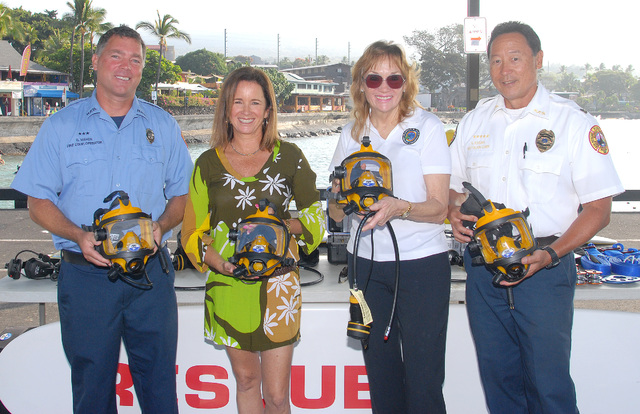It was the kind of situation that tested their training and taxed their equipment. ADVERTISING It was the kind of situation that tested their training and taxed their equipment. Two Decembers ago, Hawaii County firefighters were working their way deep
It was the kind of situation that tested their training and taxed their equipment.
Two Decembers ago, Hawaii County firefighters were working their way deep into an undersea cave off the south end of Hapuna Beach, searching for the body of 13-year-old Gwyneth Borromeo, who had been missing for four days after going cliff diving in the area.
Lacking any way to communicate clearly to the surface, divers used a line as they worked their way into the dark. A series of jerks on the line communicated basic concepts like take slack, give line, and help.
But the divers had to feed the line around corners, and the system wasn’t reliable.
“It could have cost one of our lives being in there,” said fire equipment operator Dave Mahon.
Forty feet in the sea cliff, firefighters located what they were looking for in what is known as a chimney of the cave. The body was extricated and the family was given some measure of closure.
On Saturday, a group of firefighters stood on Kailua Pier and accepted the gift of an underwater communications system that should take the guesswork out of such rescues and recoveries in the future. The AquaCom transmitter system — a gift from the Ironman Foundation through the Daniel R. Sayre Memorial Foundation — allows four divers to communicate wirelessly with each other, the rescue boat, and land personnel.
Special Operations Battalion Chief Gerald Kosaki thanked the Sayre foundation for years of donations and fundraising efforts.
“The equipment they have donated to us really surpasses,” Kosaki said. “We are the model for other jurisdictions when they look at the Sayre foundation and its support.”
Just the latest in an 18-year series of gifts to come either from or through the Sayre foundation, other equipment donated by Frank and Laura Mallery-Sayre included ropes, harnesses, dry bags, straps, swivel pulleys and other items totaling close to $42,000.
Ironman race director Diana Bertsch said she was shocked when she watched the video showing how firefighters had to communicate during the rescue.
“Frank and Laura have given so much, and have turned something so devastating in their lives into a positive,” she said.
Ironman has donated more than $100,000 to the Sayre foundation, said Laura Mallery-Sayre.
“They have always stepped up,” she said.
Since their son’s death in a fall from a Pololu Valley cliff in 1997 and a rugged effort by the fire department to retrieve the body at the bottom of a 500-foot wall, the Sayres have devoted themselves to raising more than $1 million to make sure firefighters and rescue personnel have needed equipment and that more lives are not lost.
“This allows us to keep ourselves safe and keep each other safe,” Mahon said, noting that the equipment helps put the Big Island water rescue equipment on a par with similar technology on Maui and Oahu.
Kohala Rep. Cindy Evans said the state in general is behind in technology, but it’s challenging to modernize because the need is across the board.
“It’s challenging and it’s going to be expensive,” Evans said. “It does take a community to make this happen. You put your lives on the line for the community, but we have to give you the tools.”



